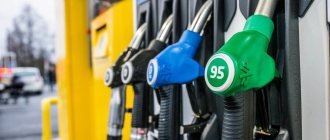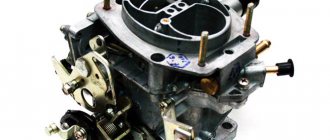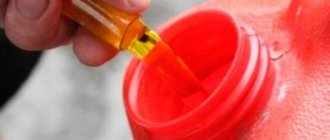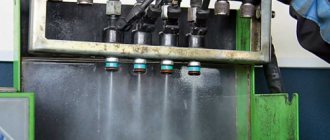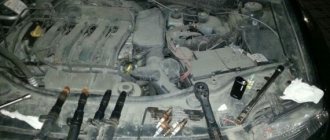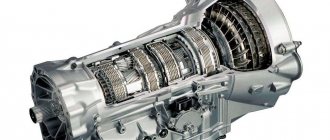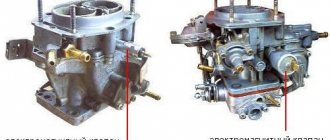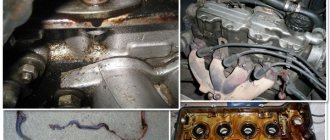Structural reasons for consumption
To identify such faults, in some cases you can carry out visual diagnostics yourself, and then contact professionals.
Lambda probe
Failure of the oxygen sensor in most cases occurs due to the use of leaded fuel. Residues of lead oxides cover the working part of the assembly. In this regard, the injectors begin to add more gasoline to the fuel mixture. This chain leads to an increased level of CO in the exhaust gases. Often it is by this indicator that you can determine that the lambda probe needs to be replaced or repaired.
Computer engine diagnostics can also indicate a non-functioning sensor. In this case, you can simply replace it with a new one. However, this is quite an expensive action.
The approximate cost of a new original lambda probe for a Japanese foreign car will be about $400.
A cheaper option for such repairs is to replace the unit with a Bosch sensor, which is a spare part for VAZ cars.
Candles
Low-quality gasoline has a detrimental effect on the operation of spark plugs in the engine. Replacing them with new ones will help in the fight to reduce fuel consumption. But when purchasing a kit, you need to check for a correctly installed gap.
How to identify low-quality candles
After all, even in branded stores, suppliers can supply low-quality goods. Then the purchase will be useless. Some products can cost up to $40 each.
Filters
Regular car maintenance will help you overcome increased fuel consumption. During this procedure, it is advisable to ensure that all filters required for this period of operation are replaced:
You shouldn’t expect much return from this action, but the positive effect will be noticeable.
Electrical part
Electrical leaks may occur due to contamination of the switch-distributor or high-voltage wires. This affects the quality of combustion of the fuel mixture in the cylinders. Incomplete combustion occurs. Therefore, you can check the electrical circuit for breakdowns. In case of obvious contamination, you can clean or partially replace damaged armor wires.
Catalysts
This element of the fuel system helps combat air pollution. But at the same time the car loses a little power.
Appearance of the catalyst
If the catalyst is faulty or is not in place at all, then this may also be the reason why the car consumes a lot of gasoline.
High idle speed
Incorrect adjustment of the idle speed level significantly contributes to consumption during warm-up, as well as when stopping the car with the engine not turned off.
For stable operation of the power unit, it is necessary to clearly set the speed specified on the passport.
Advance angle
More experienced drivers also point out to their novice colleagues that the ignition timing is adjusted correctly. A signal for this can be both unstable idling and problems with starting the car. If such symptoms appear regularly, then minor intervention in adjusting the distributor will be required.
Mass air flow sensor
An important element of a modern car is the fuel consumption sensor. Its functions include monitoring the air mass that is supplied to the engine.
Why does a car consume a lot of fuel? Causes
It's unpleasant to throw money away when your car has high fuel consumption. Those who do not trust their car to a car service try to determine the cause of gasoline consumption on their own. Others, on the contrary, rush to the service station, where the technician begins to examine the car.
Why does the car still consume a lot of gasoline? In fact, increased fuel consumption may be the result of not one, but several problems at once. Let's try to figure out what affects fuel consumption and whether it is possible to reduce fuel consumption without the help of specialists:
1. Errors in the electronic control system
One of the main reasons is a malfunction of the engine management system. This is due to the incorrect operation of the sensors, which are designed for optimal calculation of the air-fuel mixture:
- Temperature sensors (coolant and intake manifold).
- Throttle position sensors (TPS).
- Mass air flow sensor (MAF). Its service life is significantly reduced if the air filter is not changed promptly.
- Oxygen sensor (lambda probe).
Errors in these sensors to varying degrees cause a “lean” or “rich” mixture, which results in loss of power and excessive fuel consumption. All these faults are difficult to determine without diagnosing the car, but it is possible if you look for it by rebuilding the sensors.
2. Abnormal pressure in the fuel system
The pressure in the fuel system may be higher or lower than normal. It is a rare situation when there is high pressure in the fuel system; the opposite situation most often occurs.
Low pressure in the fuel system causes the engine to lose power. And on a car with an automatic transmission, it increases the operating time of the car at higher speeds and, as a result, increases fuel consumption.
3. Injector malfunction
If the car owner does not monitor the condition of the engine, then over time its efficiency will decrease, and if started, the engine will begin to stall. The reason for this is dirty injectors. The quality of gasoline atomization deteriorates and normal mixture formation is disrupted. In this case, cleaning the injectors will help, which you can easily do yourself.
4. Faulty catalyst
Over time, the catalyst may burn out or even partially collapse. We will not delve into the intricacies of the process, the main idea is: the more “clogged” the catalyst is, the richer the mixture. This in turn causes greater heating of the catalyst, which negatively affects its durability. The consequence of this will be a decrease in engine power and excessive fuel consumption.
In addition, the cause of catalyst destruction may be: dirty injectors, old spark plugs, faults in the control system or low-quality gasoline.
5. Engine temperature
The optimal operating temperature is 98 -103°C. If the engine overheats, the fuel mixture becomes discharged. The car starts to run on a lean mixture, which results in a loss of power.
If the engine is not warmed up, then increased gasoline consumption occurs due to enriched fuel injection (necessary for warming up the internal combustion engine). For example, if the temperature is 80°C or lower, then fuel consumption increases by 20%.
The reason when the engine is not operating at operating temperature lies in the engine cooling system (for example, in the thermostat). Thus, if you use the car only for short distances, when the engine does not have time to warm up enough, hence the increased fuel consumption than for long trips.
6. Dirty air filter
Yes, oddly enough, but one of the reasons when a car eats a lot of gasoline is a clogged air filter. Due to the lack of air in the engine, the effect of “air starvation” begins and the operation of the mass air flow sensor is disrupted. As a result, we again see a picture where mixture formation occurs incorrectly, which causes excessive consumption of gasoline.
Now you know that to eliminate the cause, sometimes it’s enough just to replace the air filter, and sometimes you can’t do without competent diagnostics of the car.
In addition to the above, you can reduce gasoline consumption by changing your driving style or using the air conditioner less often.
Also, do not be surprised if the car “guzzles” fuel when wheels are installed that are significantly larger than those recommended by the factory, or fuels and lubricants of inappropriate viscosity or quality are used.
Operational reasons for consumption
Breakdowns and failures are not the only reasons for increased consumption. They are often visible even to owners or are found during diagnostics by service center specialists. But not all signs can be identified by service station workers at their stands. You have to independently analyze and understand the essence of the process.
Driving style
All drivers have different driving styles. A calm driving style, without jerks and sudden acceleration/braking, is characterized by moderate and sometimes economical fuel consumption.
Winter driving in an all-wheel drive SUV
If the driver often uses sharp pressure on the accelerator, then the car cannot do without unnecessary consumption.
You can “rush” at a traffic light if the engine power allows. But at the same time, the consumption will “explode” to an exorbitant 30 liters for a passenger car. Whether it is worth using this style of behavior on the road, everyone must decide for themselves.
Car class and engine size
It is generally accepted that owners often pay for increased engine capacity with significant fuel consumption. This is a kind of tribute for comfort. A car of the same class, weight and make should have lower consumption, but in practice this formula is not always confirmed.
A massive power plant, in order to obtain results in speed or power, consumes less gasoline than a similar car with a smaller engine.
This is due to the fact that the “small” engine works with a greater load. And accordingly, more fuel will be consumed.
Terrain
The parameter is relevant for hilly and mountainous areas. If the car was initially used in flat terrain, then it had one consumption. When road conditions change (frequent traffic jams, many uphill sections), consumption may change upward.
Automatic transmission
The opinion that automatic transmission increases fuel consumption by 10-15% is often confirmed in practice. In some cases, the “increase in gluttony” can be 1-2 liters per 100 km of travel. Sometimes the difference is almost unnoticeable. It also depends on the machine itself, and not just on its presence. After all, older models with four speeds differ from six-speed automatic transmissions.
Automatic or manual transmission
To save money when driving with such a unit, we can recommend using the overdrive mode when driving outside the city.
OverDrive reduces consumption and helps you maintain speed. During city driving, owner reviews are not so clear. The characteristics of the option are clarified to a greater extent through individual experiments.
Injection systems
The sensitivity of direct injection fuel systems (D4, GDI, etc.) to low-quality gasoline is felt almost from the first days of vehicle operation. Some automakers do not even officially supply cars with a certain engine configuration to Russia. This is justified by the high cost of maintenance and repair when using low-grade fuel.
Fuel injection system
Therefore, when choosing and before purchasing a used foreign car, it is advisable to inquire about its fuel characteristics. A relatively low price for a nice car can result in very expensive repairs.
Fuel quality
Not all gas stations sell the same gasoline. Unfortunately, this fact also affects consumption. 95 may contain an excessive amount of additives. Therefore, the banal conclusion is to fill up with fuel only at proven gas stations. Although the presence of a company logo is not always a sign of quality. You have to trust your own experience.
Why is my car's fuel consumption too high?
Surely many of you have experienced increased fuel consumption in your car. In most cases, this is not due to a malfunction of the car and excessive fuel consumption is associated with external factors such as weather, driving style, fuel quality, etc. But this does not mean that increased fuel consumption in your car is not associated with a malfunction. Unfortunately, sometimes high fuel consumption indicates some kind of breakdown in your car. Let's analyze the main reasons for increased fuel consumption.
The fuel consumption of your car depends on many factors. For example, fuel consumption cannot be the same all the time. So it is quite natural for your machine to sometimes consume more than usual or less than average. This does not mean that the machine is faulty.
Consumption is affected by the distance of your trip, whether you are driving empty or loaded, time of year, wind, road surface, tires, etc.
The quality of the fuel also affects efficiency, especially when it comes to gasoline.
And finally, the average fuel consumption is influenced by you yourself, or rather by your foot, which is on the gas pedal.
That is why, in most cases, real fuel consumption differs from that declared by automakers, who measure the efficiency of cars under ideal conditions at stands and on special tracks. Read more about this here.
But unfortunately, it is not uncommon for a car to start consuming too much fuel due to some defects or malfunctions. In this case, finding the cause will be much more difficult than in case of overspending due to external factors.
The thing is that all cars are very complex technical devices with a huge number of components that are connected to each other. Accordingly, one faulty component can affect another. Because of this, the failure of even a minor component can affect the operation of a more important spare part, which can ultimately lead to excessive fuel consumption.
The worst thing is that often many malfunctions and defects in the car may not make themselves felt for a long time. For example, fuel consumption may initially increase by only a few percent and you are unlikely to notice this slight overconsumption.
But depending on the malfunction, fuel consumption can double. In this case, you will immediately notice that your car has begun to consume significantly more fuel and naturally carry out diagnostics.
conclusions
Almost any car over time requires more gasoline per 100 kilometers. It is necessary to undertake repairs only when it is economically justified. The high cost of work in this case does not cover the cost of fuel. Therefore, everyone decides for themselves whether it is worth fighting with extra liters.
My VAZ 2114 (1.5) 2005 with a mileage of 104 thousand uses about 12 liters per hundred in the city, but it’s still November, so what can we expect in winter? But my father’s 14th with a 1.6 engine consumes a stable 8.1 liters per 100 km in the city. And I asked myself: “Why is the fuel consumption so high on my 2114?” And I went looking for an answer on the Internet, as a result of which this article was created
According to the passport, Samara-2 should consume 7.6 liters per 100 km in mixed mode, in the city - no more than 9 liters. If your readings are as high as mine, then it's time to address the increased fuel consumption.
The reason for the high consumption of gasoline, both in VAZ and in other cars, may be the engine management system: it includes an Electronic Control Unit ( ECU , popularly known as the “brains”) and various sensors and drive mechanisms.
Checking the entire engine management system is quite difficult, and it is better to entrust this work to professionals, but if you want to solve the problem yourself, then go for it. Check the mass air flow sensor: Read the article How to check the mass air flow sensor on a VAZ?
The cause of increased fuel consumption can also be a faulty fuel system, namely the fuel pressure in the fuel system (How to check the pressure in the fuel system?):
- Clean/replace the fuel injectors (Cleaning fuel injectors. 4 ways/ How to remove injectors?).
- Replace the fuel pump.
- Replace the fuel filter (Replacing the VAZ fuel filter).
- DS is faulty.
- The phase sensor (PF) is faulty.
- The oxygen sensor (Lambda probe) dies.
- A clogged air filter will increase your fuel consumption by about 3 liters. So it’s better to replace it once again; it costs about 120 rubles. How to replace the air filter?
It also doesn’t hurt to check the following elements:
Increased gasoline consumption may be due to low compression in the engine (How to measure engine compression correctly?). Consumption is also affected by an incorrectly set ignition angle and incorrect valve timing.
At worst, check the tire pressure, they also affect fuel consumption. (What pressure should be in the tires of a car?)
